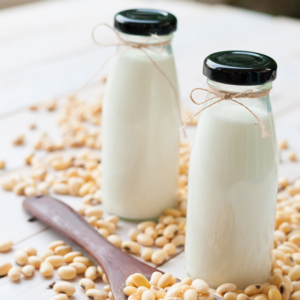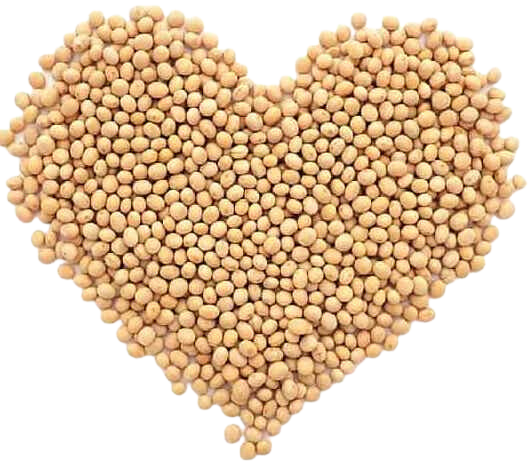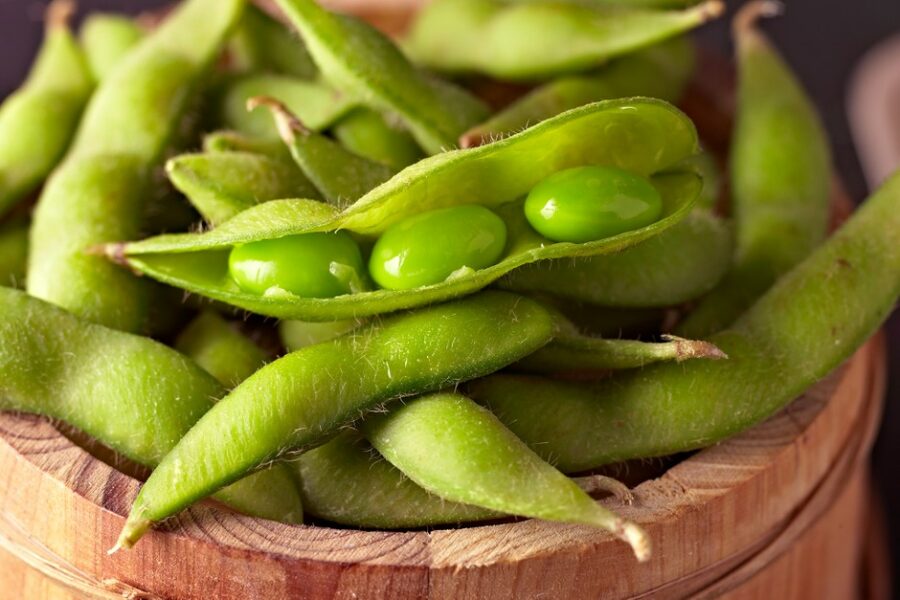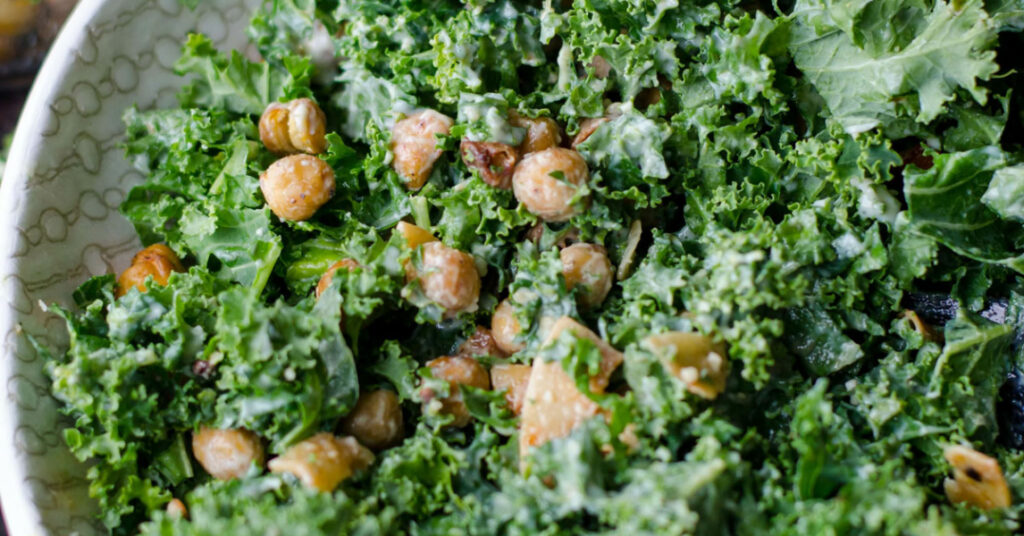To Soy or not to Soy?
Is Soy good or bad for you? When ordering my soy latte recently I almost feel like I’m doing something naughty.
I’ve over heard barista conversations advising customers about the negative impacts of soy and I have clients ask me in confusion, should I include soy in my diet or not? So I though it is time to have a deeper look and settle the question once and for all – To soy or not to soy?
Soy is a bean – what’s its nutritional content?

Soy is a food that is;
- high in protein
- high in fibre
- low in sugar
- high in healthy polyunsaturated fats.
It is also high in some key minerals such as
- manganese
- magnesium
- vitamin K
- folate
As well as phytonutrients soy phytosterol, soyasaponin and lecithin. From a nutritional perspective soy is a very healthy food, with numerous health benefits. So lets look a bit deeper.
Phytoestrogens
Where soy starts to get into/ trouble is with is Isoflavones. Isoflavones are phytoestrogens – plant compounds that have oestrogen-like structures.
There are three types of isoflavones in soy
- genistein (dominant)
- daidzein
- glycitein
There are some studies published from 2005 by Retha R. Newbold suggesting that genistein exposure is linked to abnormal oestrous cycle, altered ovarian function, and infertility in mice. There is however some controversy around this as the genistein was being isolated and injected into mice (2). This doesn’t necessarily give an accurate view on what happens once a whole soy bean has been eaten and ingested.
If you look at Asian countries where soy consumption is much higher, their populations have less breast cancer, prostate cancer, and cardiovascular disease, and fewer bone fractures. Additionally, women in these populations report fewer menopausal symptoms, such as hot flashes, and both men and women have a lower incidence of aging-related brain diseases.
Soy health benefits
If we skip ahead to research from the 2020’s then soy is looking pretty promising. Regular intake of soy and soy isoflavones has been linked to;

- Obesity-prevention(3, 4, 6)
- Blood glucose reduction (5)
- Cholesterol lowering (13)
- Lowering blood pressure (7)
- Osteoporosis reduction post menopause (11)
- Reduced incidence of breast cancer (10)
- Reduced incidence of endometrial cancer (14)
- Reduced incidence of ovarian cancer (10)
- Anti-oxidative effect
- Anti-inflammatory (8)
- Improved cognitive function (9)
- Reduce the risk of endometriosis (12)
How can soy affect your hormones and thyroid?
Soy and Hormones
If soy has phytoestrogens then how can it be good for your hormones? Aren’t too much oestrogen’s bad?
This is a good question and one that has left researchers a little confused. It makes sense to use phytoestrogens post menopause – your oestrogen is dropping off so eat more phytoestrogens and boost them up. After all oestrogen’s in moderate amounts are beneficial for bone health, mood, immune health, the cardiovascular system and optimal functioning reproductive system. But if you are suffering from oestrogen dominance and conditions and/or symptoms associated with this such as endometriosis, heavy periods, bad pms, acne then shouldn’t you avoid phytoestrogens? Well actually the answer is No, and here is why.
Phytoestrogens are naturally selective to specific types of oestrogen receptors. There are two types of oestrogen receptors in the body;
- Oestrogen receptor alpha (ORα) and
- Oestrogen receptor beta (ORβ).
Phytoestrogens from soy preferentially bind to beta receptors. Within the body the liver, bones, cardio vascular system contain mainly ORβ, whilst the uterus, ovaries and breast tissue contain more ORα. Oestrogen signaling is selectively stimulated or inhibited depending upon a balance between ORα and ORβ activities in target organs. So as the phytoestrogens in soy promote activity in ORβ systems and organs they down regulate activity in ORα systems (15). Therefore phytoestrogens have agonist and antagonist effects on oestrogen receptors.
Soy and Thyroid
In short the issue with soy and thyroid is that the two main soy isoflavones, genistein and daidzein, inhibit thyroid peroxidase, an enzyme necessary for making thyroid hormone.
However this action is blocked by iodine (16). So if your iodine is fine then it is not an issue. Also the studies that have discovered this are based on very large amounts of soy, for example babies on soy formula developing goitres and even in this scenario, the goitre was releived by adding iodine to the formula. More recent studies where women have been given 90mg of soy daily – this is equal to drinking 1L of soy milk or 250g of tofu a day found no impact on thyroid after 6 months (17). So unless your going soy crazy, or supplementing with high dose isoflavones such as genistein, then there is no need to worry about soy and thyroid.
Based on the research soy is a healthy food that can benefit many systems in your body including your hormones. So enjoy your soy latte, tempeh, tofu and veg curry.
Stay tuned for my next blog, where I take a deep dive into all are soy products created equal. And what are the best options when it comes to soy products.
References
- Weaver C.M., Plawecki K.L. Dietary calcium: Adequacy of a vegetarian diet. Am. J. Clin. Nutr. 1994;59((Suppl. 5)):1238S–1241S. doi: 10.1093/ajcn/59.5.1238S.
- Barrett JR. The science of soy: what do we really know? Environ Health Perspect. 2006 Jun;114(6):A352-8. doi: 10.1289/ehp.114-a352. PMID: 16759972; PMCID: PMC1480510.
- Ruscica M., Pavanello C., Gandini S., Gomaraschi M., Vitali C., Macchi C., Morlotti B., Aiello G., Bosisio R., Calabresi L., et al. Effect of soy on metabolic syndrome and cardiovascular risk factors: A randomized controlled trial. Eur. J. Nutr. 2018;57:499–511. doi: 10.1007/s00394-016-1333-7.
- Bakhtiari A., Hajian-Tilaki K., Omidvar S., Nasiri-Amiri F. Clinical and metabolic response to soy administration in older women with metabolic syndrome: A randomized controlled trial. Diabetol. Metab. Syndr. 2019;11:1–12. doi: 10.1186/s13098-019-0441-y. [PMC free article] [PubMed] [CrossRef] [Google Scholar] [Ref list]
- Guevara-Cruz M., Godinez-Salas E.T., Sanchez-Tapia M., Torres-Villalobos G., Pichardo-Ontiveros E., Guizar-Heredia R., Arteaga-Sanchez L., Gamba G., Mojica-Espinosa R., Schcolnik-Cabrera A., et al. Genistein stimulates insulin sensitivity through gut microbiota reshaping and skeletal muscle AMPK activation in obese subjects. BMJ Open Diabetes Res. Care. 2020;8:e000948. doi: 10.1136/bmjdrc-2019-000948.
- Gan M., Shen L., Wang S., Guo Z., Zheng T., Tan Y., Fan Y., Liu L., Chen L., Jiang A., et al. Genistein inhibits high fat diet-induced obesity through miR-222 by targeting BTG2 and adipor1. Food Funct. 2020;11:2418–2426. doi: 10.1039/C9FO00861F. [PubMed] [CrossRef] [Google Scholar
- Zhang H.P., Zhao J.H., Yu H.X., Guo D.X. Genistein ameliorated endothelial nitric oxidase synthase uncoupling by stimulating sirtuin-1 pathway in ox-LDL-injured HUVECs. Environ. Toxicol. Pharmacol. 2016;42:118–124. doi: 10.1016/j.etap.2016.01.011. [PubMed] [CrossRef] [Google Scholar]
- Zhang H., Zhao Z., Pang X., Yang J., Yu H., Zhang Y., Zhou H., Zhao J. Genistein Protects Against Ox-LDL-Induced Inflammation Through MicroRNA-155/SOCS1-Mediated Repression of NF-kB Signaling Pathway in HUVECs. Inflammation. 2017;40:1450–1459. doi: 10.1007/s10753-017-0588-3. [
- Cui C, Birru RL, Snitz BE, Ihara M, Kakuta C, Lopresti BJ, Aizenstein HJ, Lopez OL, Mathis CA, Miyamoto Y, Kuller LH, Sekikawa A. Effects of soy isoflavones on cognitive function: a systematic review and meta-analysis of randomized controlled trials. Nutr Rev. 2020 Feb 1;78(2):134-144. doi: 10.1093/nutrit/nuz050. PMID: 31504836; PMCID: PMC7808187.
- Boutas I, Kontogeorgi A, Dimitrakakis C, Kalantaridou SN. Soy Isoflavones and Breast Cancer Risk: A Meta-analysis. In Vivo. 2022 Mar-Apr;36(2):556-562. doi: 10.21873/invivo.12737. PMID: 35241506; PMCID: PMC8931889.
- Barańska A, Kanadys W, Bogdan M, Stępień E, Barczyński B, Kłak A, Augustynowicz A, Szajnik M, Religioni U. The Role of Soy Isoflavones in the Prevention of Bone Loss in Postmenopausal Women: A Systematic Review with Meta-Analysis of Randomized Controlled Trials. J Clin Med. 2022 Aug 10;11(16):4676. doi: 10.3390/jcm11164676.
- Tsuchiya M, Miura T, Hanaoka T, Iwasaki M, Sasaki H, Tanaka T, Nakao H, Katoh T, Ikenoue T, Kabuto M, Tsugane S. Effect of soy isoflavones on endometriosis: interaction with estrogen receptor 2 gene polymorphism. Epidemiology. 2007 May;18(3):402-8. doi: 10.1097/01.ede.0000257571.01358.f9. PMID: 17474167.
- George KS , Muñoz J , Akhavan NS , Foley EM , Siebert SC , Tenenbaum G , Khalil DA , Chai SC , Arjmandi BH . Is soy protein effective in reducing cholesterol and improving bone health? Food Funct. 2020 Jan 29;11(1):544-551. doi: 10.1039/c9fo01081e. PMID: 31848551.
- Malloy KM, Wang J, Clark LH, Fang Z, Sun W, Yin Y, Kong W, Zhou C, Bae-Jump VL. Novasoy and genistein inhibit endometrial cancer cell proliferation through disruption of the AKT/mTOR and MAPK signaling pathways. Am J Transl Res. 2018 Mar 15;10(3):784-795. PMID: 29636868; PMCID: PMC5883119.
- Lee HR, Kim TH, Choi KC. Functions and physiological roles of two types of estrogen receptors, ERα and ERβ, identified by estrogen receptor knockout mouse. Lab Anim Res. 2012 Jun;28(2):71-6. doi: 10.5625/lar.2012.28.2.71. Epub 2012 Jun 26. PMID: 22787479; PMCID: PMC3389841.
- Teas J, Braverman LE, Kurzer MS, Pino S, Hurley TG, Hebert JR. Seaweed and soy: companion foods in Asian cuisine and their effects on thyroid function in American women. J Med Food. 2007 Mar;10(1):90-100. doi: 10.1089/jmf.2005.056. PMID: 17472472.
- Bruce B, Messina M, Spiller GA. Isoflavone supplements do not affect thyroid function in iodine-replete postmenopausal women. J Med Food. 2003 Winter;6(4):309-16. doi: 10.1089/109662003772519859. PMID: 14977438.


